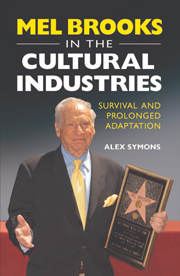Book contents
- Frontmatter
- Contents
- Acknowledgements
- Introduction
- 1 Rethinking Adaptation Studies: Survival Strategies in the Cultural Industries
- 2 From Sitcoms to ‘Parody-coms’: Writing for American TV, 1949–89
- 3 Prolonged Stardom: Audio Records, TV and Film, 1961–2004
- 4 Recycled Hollywood for the TV Generation: The Rise of Parody and the Fall of Mel Brooks the Director, 1974–95
- 5 The Integration of the Film and Theatre Industries: The Producers, 1968–2007
- Conclusion
- Bibliography
- Index
3 - Prolonged Stardom: Audio Records, TV and Film, 1961–2004
Published online by Cambridge University Press: 05 August 2013
- Frontmatter
- Contents
- Acknowledgements
- Introduction
- 1 Rethinking Adaptation Studies: Survival Strategies in the Cultural Industries
- 2 From Sitcoms to ‘Parody-coms’: Writing for American TV, 1949–89
- 3 Prolonged Stardom: Audio Records, TV and Film, 1961–2004
- 4 Recycled Hollywood for the TV Generation: The Rise of Parody and the Fall of Mel Brooks the Director, 1974–95
- 5 The Integration of the Film and Theatre Industries: The Producers, 1968–2007
- Conclusion
- Bibliography
- Index
Summary
Throughout the four decades of his career, Mel Brooks's strategy of adaptation has been central to his longevity as a high-profile performer. Since establishing a selection of trademark personas, jokes and routines in the 1960s and 1970s, Brooks made the best use of those inventions by prolonging them through adaptation into a trail of subsequent appearances, maintaining his ‘star’ status through the 1980s, 1990s and to date. Brooks's ability to continually renew this material is foremost due to his strategy of remediation – essentially meaning he has replayed his performance material in different media, moving between audio records, voiceovers, Hollywood film acting, television talk shows and sitcom appearances over many years. Brooks has also demonstrated great versatility, often significantly adapting his performance style and his material for different eras and audiences. Throughout his career, Brooks has capitalised on the synergy between his various performances. Furthermore, this long campaign of adaptations has ultimately earned Brooks critical prestige, in that his most recent audio record, The 2000 Year Old Man in the Year 2000 (1997), earned Brooks a Grammy in 1998, and his performance in the sitcom Mad About You (NBC, 1992-9) won an Emmy in 1997, 1998 and 1999.
- Type
- Chapter
- Information
- Mel Brooks in the Cultural IndustriesSurvival and Prolonged Adaptation, pp. 79 - 109Publisher: Edinburgh University PressPrint publication year: 2012



